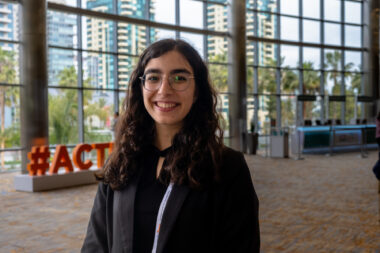ACTRIMS 2023: Delays in Ocrevus infusions not tied to greater MS activity
Dosing schedules changed for relapsing, progressive patients during COVID-19

People with multiple sclerosis (MS) being treated with Ocrevus (ocrelizumab) less frequently than the recommended every six months are not more likely to experience inflammatory disease activity, an analysis of some 360 patients whose dosing schedules changed during the COVID-19 pandemic suggests.
Nicole Bou Rjeily, MD, a postdoctoral researcher at Johns Hopkins University, presented the findings at the Americas Committee for Treatment and Research in Multiple Sclerosis (ACTRIMS) Forum, held Feb. 23-26 in San Diego and virtually.
The poster was titled, “Extended Interval Dosing of Ocrelizumab in Patients with Multiple Sclerosis Is Not Associated with Meaningful Differences in Disease Activity.”
Most patients treated at or within eight months of last Ocrevus dose
Ocrevus is approved to treat relapsing types of MS as well as primary progressive disease (PPMS). The therapy works by depleting B-cells, a type of immune cell with a central role in driving MS inflammation. The medication is sold by Genentech, a Roche company, which was not involved in the present analysis.
Administered via an infusion into the bloodstream, Ocrevus has a recommended dosing schedule of one infusion every six months. However, when the COVID-19 pandemic hit, many clinicians and patients opted for less frequent dosing (sometimes called extended-interval dosing or EID) over concerns that the immune-suppressing therapy might increase risks with infection or reduce the effectiveness of vaccines.
This was “an ideal period for us to evaluate whether such an extended-interval dosing was actually associated with any breakthrough MS activity,” Bou Rjeily said.

Nicole Bou Rjeily, MD, a postdoctoral research fellow at Johns Hopkins University, at the ACTRIMS Forum 2023. (Photo by Multiple Sclerosis News Today)
This analysis included data covering 364 MS patients who were being treated with Ocrevus at Johns Hopkins. Of them, 275 had relapsing-remitting MS (RRMS) and 89 had progressive forms of the disease.
At the end of follow-up, patients were on Ocrevus for an average of about three years. Dosing intervals across the group ranged from four months — slightly more frequent than recommended — to 32 months, or approaching three years.
About half of the patients — 137 with RRMS and 45 with progressive MS — received at least one dose of Ocrevus given at or within eight months of their last dose, and about 1 in 5 patients (57 with RRMS and 16 with progressive MS) had at least a year between doses.
Age, sex, race or ethnicity, and MS type were comparable between patients who received infusions every six months and those with less frequent dosing, though patients on less frequent dosing generally had been using Ocrevus for longer.
The most common reason for delays in infusions was concerns related to COVID-19; other common reasons included infection or pregnancy.
Over the course of follow-up, three RRMS patients experienced an MS relapse. Two had received Ocrevus every six months according to the recommended schedule, and one had less frequent dosing.
Among the 261 patients with available data from multiple MRI scans, five RRMS patients showed new lesion activity while on Ocrevus. One was on standard dosing, while the other four had extended-interval dosing. Notably, for two of the extended-interval patients, the new lesions developed after they had resumed the every-six-months dosing schedule.
As such, “it’s not really clear whether the new lesion was due to extended-interval dosing,” Bou Rjeily said.
No relapses or new MRI activity was reported among progressive MS patients on Ocrevus in this study.
“There appeared to be no marked risk of inflammatory MS activity” for patients who had delays in infusions compared with those who received Ocrevus every six months, the researchers concluded.
Bou Rjeily noted that this study is limited by its observational and retrospective nature. The decision of whether or not to delay Ocrevus infusions was made on a patient-by-patient basis, which raises a high likelihood of confounding by indication. In other words, it’s probable that patients with relatively stable disease were more likely to have infusion delays, which could influence the results.
The researcher called for larger, prospective studies to formally compare the efficacy of extended-interval dosing with the recommended six-month dosing schedule. Such future studies also could evaluate whether less frequent dosing reduces the risk of side effects. Findings regarding side effects were not available for this analysis.
Less frequent dosing could also reduce the cost of treatment, Bou Rjeily noted.
“There appear to be no marked risk of MS inflammatory activity in those patients with extended-interval dosing, but of course, larger prospective studies are needed … to confirm the results and even look at” rates of side effects or infections, Bou Rjeily concluded.
Note: The Multiple Sclerosis News Today team is providing in-depth coverage of the ACTRIMS Forum 2023 Feb. 23–25. Go here to see the latest stories from the conference. Follow along on Facebook, Twitter, and Instagram for live updates using the hashtag #actrims2023.







